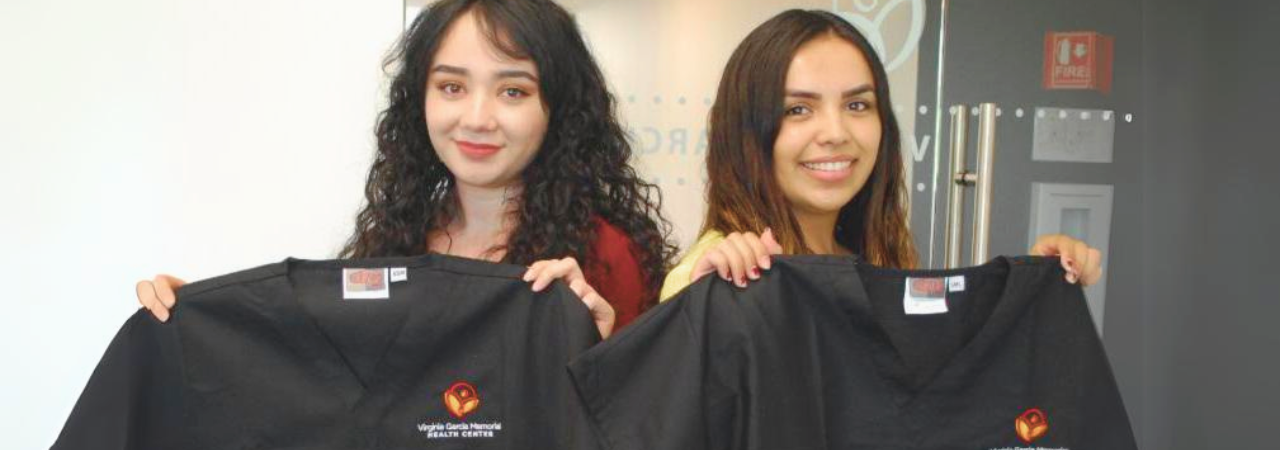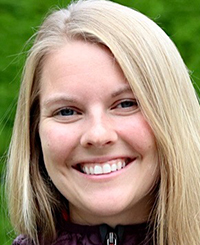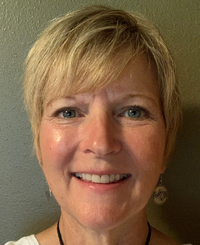Unique dental assisting program in Portland changes lives

Above: From left, 2019 PCC ICDA program graduates and Oregon EFDAs Giselle Ramirez Rodriguez and Alondra Espitia with shirts from sponsor Virginia Garcia Memorial Health Center.
Portland Community College’s (PCC’s) integrated community dental assisting (ICDA) program is now in its sixth year, with 16 students onboard. The program’s unique model is helping bolster the dental assisting profession in Oregon, where there’s a critical dental assistant workforce shortage.
“This program helps fill a demand for dental assistants through its alternative delivery model, to get individuals into the workplace sooner,” says PCC Dental Professional Development and Educational Coordinator Stacy Kimsey, who manages the ICDA program. “It’s definitely finding success, and we’re getting a lot of interest.”

“This program helps fill a demand for dental assistants through its alternative delivery model, to get individuals into the workplace sooner. . . . The program has been accommodating to support students in real life.”
— Stacy Kimsey
Notably, the ICDA program has created opportunity for a diverse student population to become dental assistants in Oregon. Each year, it offers a professional pathway for up to 24 non-traditional students, who may be parents, caregivers, or new U.S. citizens. “The program has been accommodating to support students in real life,” Kimsey adds.
Benefitting from flexible schedules
The ICDA program’s hybrid approach has students taking online, didactic courses; attending the clinical lab day every Saturday; and doing a hands-on externship. Graduates earn a certificate of completion after nine months, and 42 students have graduated from the PCC ICDA program to date.
Kimsey believes it takes an especially dedicated student to be successful in the ICDA program. “When individuals apply for the program, we have an in-depth discussion about the structure of our program. It takes a lot of self-motivation to do online courses.”

“This program allows students to take care of their other responsibilities — most times, to keep a job and food on the table. This program is changing people’s lives.”
— Virginia Jorgensen, CDA
With schedule flexibility, students can work full-time, a benefit for those with jobs and families.
“This is a different group of students than I’ve ever had the opportunity to teach before,” says Virginia Jorgensen, CDA, lead dental assisting instructor for the ICDA program. “Their stories are amazing and interesting. This program allows students to take care of their other responsibilities — most times, to keep a job and food on the table.
“This program is changing people’s lives.”
Sponsoring students’ education
Most students’ tuition is sponsored by local dental practices and organizations that typically employ them post-graduation. “The interest from not only students, but also community partners, has grown,” Kimsey notes. The first cohort had one sponsor, Kaiser Permanente, and there are now more than five sponsors.
Sponsorship opens the door for ICDA program applicants who otherwise might not have considered furthering their education. It also helps sponsors fill open positions — one of the sponsors of 10 students this year has over 60 vacant dental assistant roles. “Out of the 10, if they hire seven, which is typical, that makes a difference in somebody’s office, and for some patients who wouldn’t otherwise have been able to see a dentist because they didn’t have assistants,” Jorgensen says.
Alondra Espitia, an Oregon EFDA, learned about the ICDA program from her employer, Virginia Garcia Memorial Health Center in Oregon, where she was working in the call center. With Virginia Garcia as her sponsor, Espitia graduated from the program in 2019 and then became a dental assistant at the health center.
“What attracted me to this program was I was able to work full-time and go to school at the same time,” Espitia says. “My experience was great. I was able to work with helpful and supportive dental assistants and have a really good team of doctors who helped me through the program. I still work alongside some of my mentors.”
Kimsey also has observed overall satisfaction with job placement. “The ICDA program has blossomed and is so great for the individuals who are coming into a career, and for the sponsors that need to fill these roles to serve their patients,” Kimsey notes. “There’s not as much job turnover when the employer is investing money and time into someone’s education and career.”
Measuring excellence with exams
PCC offers two dental assistant programs: a one-year, Commission on Dental Accreditation (CODA)-accredited certificate program, and the nine-month, non-credit ICDA program, which has three terms.
ICDA students take the Dental Assisting National Board (DANB) Infection Control (ICE) exam in term one, the DANB Radiation Health and Safety (RHS) exam in term two, and focus on becoming an Oregon Expanded Function Dental Assistant in term three.
“By taking DANB exams, students feel like they’ve joined a profession where education, training, and assessment is part of it,” Jorgensen says. “If you don’t have that part, it’s just another job.”
Entering a rewarding profession
Espitia acknowledges that balancing school and work was stressful at first, but it became more manageable: “I found good study habits. I definitely used the DALE Foundation exam-preparation materials throughout those nine months.”
Espitia says her ICDA program experience was worth it. She enjoys working as a dental assistant and helping patients, especially those who are anxious or scared initially, but leave feeling appreciative. She now works as a clinical lab instructor for the ICDA program and says being part of students’ journeys is “so cool.”
“I see myself in them,” Espitia elaborates. “By the end of the program, you see a huge change in everyone, in their confidence. They’re exhausted, but also excited to finally earn something they worked hard for.”
The ICDA program graduates remind Jorgensen of her own journey: “I was an on-the-job-trained dental assistant myself. If I had not had that opportunity, I’m not sure I could have become a dental assistant because I couldn’t afford to go to college at the time. And dental assisting has been an awesome profession.”

